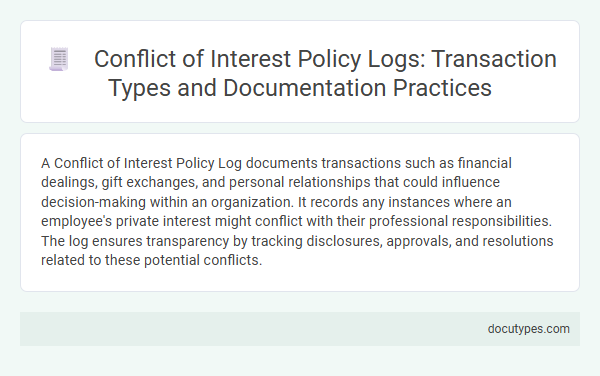A Conflict of Interest Policy Log documents transactions such as financial dealings, gift exchanges, and personal relationships that could influence decision-making within an organization. It records any instances where an employee's private interest might conflict with their professional responsibilities. The log ensures transparency by tracking disclosures, approvals, and resolutions related to these potential conflicts.
Introduction to Conflict of Interest Policy Logs
Conflict of Interest Policy Logs serve as crucial tools for maintaining transparency within organizations. These logs systematically document transactions that may present potential conflicts of interest.
You can expect to find entries detailing financial transactions, gifts, outside employment, and any personal or professional relationships that might influence decision-making. This record-keeping ensures accountability and supports ethical standards across all organizational activities.
Importance of Logging Conflict of Interest Transactions
Conflict of interest policy logs meticulously document transactions to ensure transparency and accountability within an organization. Maintaining an accurate log is crucial for identifying potential biases and protecting the integrity of decision-making processes.
- Financial Interests - Transactions involving personal financial gains that could influence professional decisions are recorded to prevent unethical conduct.
- Gifts and Benefits - Logs capture details of any gifts or benefits received that might affect impartiality or create perceived conflicts.
- Outside Employment - Engagements in external jobs or consulting roles are documented to assess their impact on organizational loyalty and objectivity.
Common Types of Conflict of Interest Transactions
Conflict of interest policy logs document various types of transactions where personal interests may influence professional decisions. These logs ensure transparency and accountability in organizational operations.
Common types of conflict of interest transactions include financial dealings, such as investments or loans between employees and the organization. Other documented transactions involve gifts or favors that could affect impartiality. Additionally, family relationships and outside employment that might impact decision-making are recorded in these logs.
Policy Guidelines for Logging Transactions
Conflict of interest policy logs document financial transactions, gifts, and affiliations that may influence decision-making. Policies require detailed records of transactions involving employees, vendors, and related parties to ensure transparency. Logging guidelines emphasize accuracy, completeness, and timely updates to maintain compliance and accountability.
Documentation Standards and Best Practices
A Conflict of Interest Policy Log documents a variety of transactions such as financial interests, gifts, consulting agreements, and any relationships that might influence decision-making. These records ensure transparency and help maintain organizational integrity by clearly outlining potential conflicts.
Documentation standards require entries to include detailed descriptions, dates, parties involved, and the nature of the interest or transaction. Your log should follow best practices by regularly updating records, ensuring accuracy, and securing confidential information to support compliance and audit readiness.
Role-Based Access and Responsibility Assignment
| Transaction Type | Description | Role-Based Access | Responsibility Assignment |
|---|---|---|---|
| Financial Interests Disclosure | Records of personal financial interests that may influence organizational decisions. | Access limited to compliance officers and designated ethics committee members. | Employees must disclose their interests; compliance officers review and verify disclosures. |
| Contractual Relationships | Documentation of contracts involving employees or their close relations. | Restricted access for legal and procurement teams with audit trail controls. | Procurement officers manage contracts; legal team assesses conflict risks. |
| Gift and Hospitality Declarations | Logs of accepted or declined gifts that could affect impartiality. | Records accessible by department heads and compliance personnel only. | Employees report gifts; managers approve or reject declarations based on policy. |
| Outside Employment Notifications | Entries related to employees' external work engagements that may conflict with duties. | Human Resources and ethics officers have exclusive access. | You are responsible for submitting notifications; HR evaluates for conflict potential. |
| Conflict Resolution Actions | Actions taken to manage or mitigate identified conflicts of interest. | Access controlled to senior management and compliance teams. | Compliance officers coordinate resolution; management implements corrective steps. |
Digital vs. Manual Logging Methods
Conflict of Interest Policy logs record various transactions to ensure transparency and compliance. These transactions can be captured using either digital or manual logging methods, each with distinct advantages and limitations.
- Financial Transactions - Documenting payments, gifts, or benefits received that may influence decision-making processes.
- Personal Relationships - Recording instances where personal connections could affect impartiality in business activities.
- Digital Logging Methods - Utilize software platforms to automatically track, store, and analyze conflict of interest entries securely and efficiently.
- Manual Logging Methods - Involve physical record-keeping such as paper logs, which may introduce higher risk of errors or loss but can be useful in low-tech environments.
Your choice between digital and manual methods impacts the accuracy, accessibility, and security of conflict of interest documentation.
Audit Trails and Review Processes
What types of transactions are documented in a conflict of interest policy log? Transactions involving financial interests, gifts, and outside employment are typically recorded to ensure transparency. Audit trails and review processes help track these entries, providing accountability and facilitating thorough investigations.
Record Retention and Data Security
A Conflict of Interest Policy Log typically documents financial transactions, gifts, and outside employment that could influence decision-making. Accurate record retention ensures all entries are securely stored for compliance audits and legal review. Your data security measures must protect this sensitive information from unauthorized access and potential breaches.
What Types of Transactions Are Documented in a Conflict of Interest Policy Log? Infographic

